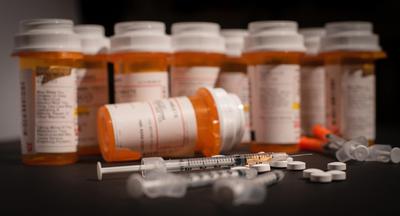How Fentanyl Is Costing Lives in the Opioid Epidemic
In the U.S., fentanyl has become a leading reason for fatal drug overdoses. At 50-100 times the strength of morphine, more than 150 people die every day because of synthetic opioids and fentanyl overdoses.
With the growing problem of opioid addiction, fentanyl has become a significant danger. This article talks about how fentanyl became a problem, why it's harmful, and what employers can do to keep their workplaces drug-free. Keep reading to learn more.

Understanding the Threat
Fentanyl dangers include high potency and difficult detection. As little as two milligrams can cause a fentanyl overdose in adults. Since the lethal amount of fentanyl is so small, it is nearly impossible to see, taste, or smell. In fact, the CDC states that fentanyl test strips are usually necessary to detect the drug. In 2022, at least 73,654 Americans died from fentanyl overdoses. The DEA found that 6 out of 10 fake prescription pills that are laced with fentanyl contain a lethal dose.
The rise of fentanyl
Starting in 2013, the third wave of the opioid epidemic impact began, and 3,105 people died because of synthetic opioid overdose. In 2022, fentanyl overdoses resulted in 23 times more deaths than in 2013.
Impact on the workforce
Opioid abuse in the workplace can result in accidents and injuries. Promoting a drug-free workplace can help ensure workplace safety, prevent hazards, and contribute to addiction prevention.
Employer Responsibilities
Promoting health and safety means addressing potential risks like substance abuse head-on. Employers can create a healthier workplace by establishing drug testing policies, offering drug education and health programs, and ensuring well-trained management.
Legal obligations
Before implementing a drug testing program at your company, familiarize yourself with local, state, and federal regulations. Requirements may vary depending on your industry and location.
Benefits of a drug-free workplace
Drug testing benefits can include:
Combatting the Crisis with Health Street
Substance abuse has become one of the biggest challenges in the U.S. Health Street testing solutions can help you ensure a drug-free and safer workplace.
Drug testing as a deterrent
One of the main drug testing benefits is deterring employees from endangering themselves and colleagues due to substance abuse, which can lead to workplace accidents.
Services offered by Health Street
Health Street testing includes a range of drug test types, offering a solution for any industry. Our drug testing services cover everything from standard urine tests to hair follicle tests for DOT and non-DOT employers. We even offer post-accident testing. Count on us for thorough and reliable drug testing solutions.
Implementing a Drug Testing Program
Do you want to make informed hiring decisions, promote workplace safety, and protect your company against fentanyl dangers?
Steps to initiate
Here are a few tips to get started:
Addressing positives and support for affected employees
It's hard to know the challenges your employees face. Creating a drug-free program and seeking assistance from local groups or coalitions can help address drug-related issues at work.
Future-proofing the Workplace
Ongoing education
Be sure to stay informed about the latest fentanyl dangers and the opioid epidemic impact. Certain drugs impact certain locations more or less frequently.
Monitoring and adapting the program
Regularly reviewing and updating your drug policy can ensure compliance with all regulations, and shows a commitment to keeping your employees safe.
Take a step towards safeguarding your workforce from the opioid crisis. Register your company for comprehensive drug testing services with Health Street today.
Frequently Asked Questions
What is the public health crisis of fentanyl?
Fentanyl's growing presence has led to a sharp increase in drug overdose deaths over the years. In 2022, at least 73,654 Americans lost their lives to this opioid. Between 2020 and 2021, synthetic opioid deaths increased by 22 percent.
What are the costs associated with the opioid epidemic?
Recent data from the CDC shows that the opioid epidemic cost the U.S. almost $1.5 trillion in 2020.
How much does the opioid crisis cost in healthcare?
Every year, opioid-related issues cost $35 billion in healthcare. Patients who overdosed on opioids accounted for $1.94 billion in yearly hospital costs.





